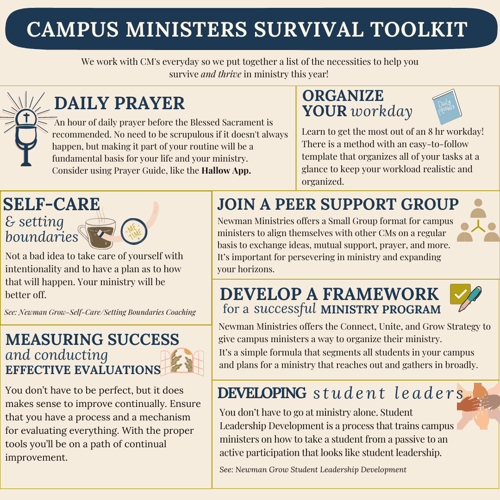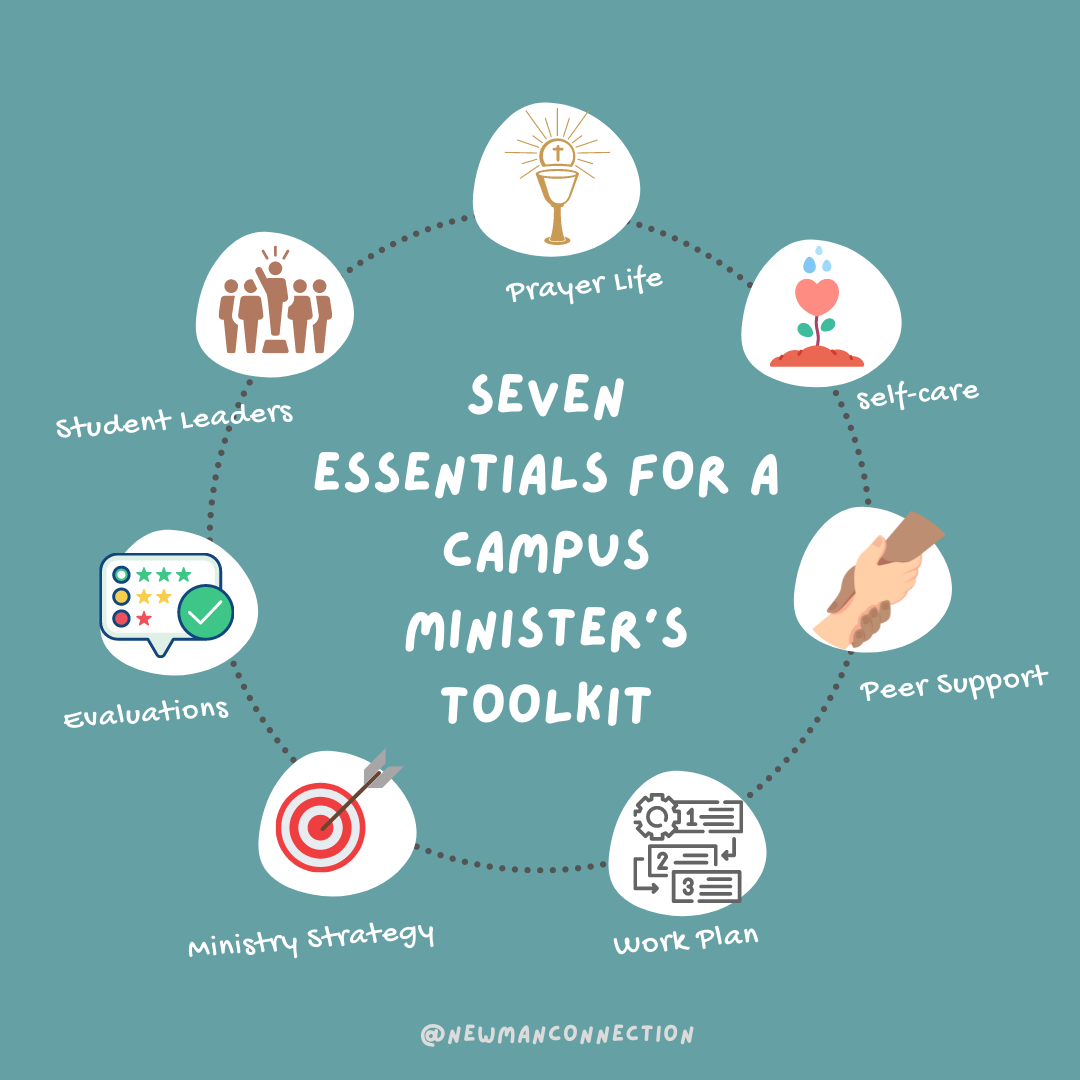
Every campus minister needs a variety of tools to serve in their roles confidently. Here are seven you can add to your toolkit (free coaching available).
Whether you’re new to your role or you’ve been doing it for years, the scope of campus ministry is broad and there’s deep personal investment in a mission that includes the salvation of souls. Forming a faith community and encouraging its members to contribute to the Catholic identity on campus is no small feat and requires a host of skills and abilities.
A typical job description for a campus minister might include developing and coordinating programming to include spiritual formation, social events and retreats. Counseling, discipleship and fostering evangelization are also part of the job – as is serving as the liaison between the ministry and the university while working collaboratively with other ministry staff. Recruiting, training and directing a student leadership team to carry out the mission of the ministry is also a responsibility of a campus minister. And of course, there are the “other duties as assigned” which may include cooking, cleaning, managing the finances, building maintenance and more.
This is quite the repertoire of responsibilities and while you no doubt bring many gifts, lots of experience and dedication to this role (campus ministers are some of the most joyful, adaptable and deeply spiritual people I know!), it’s important to have tools and systems of support in place so you can serve in your role with confidence and resiliency.
We’ve put together a toolkit with seven essential elements to lead your campus ministry with confidence.
- Prayer life
- Self-Care/Boundary Setting
- Peer Support
- Ministry Strategy
- Evaluations
- Developing Student Leaders
- Work Plan

A Life of Prayer
Our friend and campus minister, Jeff Hedglen, shared with us his practices for a healthy and growing spiritual life and how he models this to his students. Spiritual practice looks different for everyone, and one of the beautiful parts of being Catholic is that there are so many examples of spiritual practice to choose from! What you choose to include in your life of prayer isn’t as important as creating routine and consistency. Here are a few practices to consider:
- Adoration - One holy hour a day in front of the Blessed Sacrament might include bringing a list of people to pray for, praying a rosary, journaling, reading Sacred Scripture or just sitting in stillness with the presence of Jesus.
- Lectio Divina - Lectio Divina translated is “divine reading” and is a way to connect to God’s word through prayer. Allow the Lord to speak to you through the “ear of your heart”. You can remember the 4 Rs: Read, Reflect, Respond, Rest.

- Holy Mass - Mass is the most beautiful act of worship for our Church and the place where we can come together in Christian fellowship to express our faith commitment and be filled with Jesus Christ.
- Confession - Confession allows us to examine our conscience, experience concrete forgiveness and receive graces from the Lord that we desperately need to live a sanctified life.
- Pray the rosary - The rosary is one of the most powerful devotions in the Catholic Church. Our Lady intercedes for us for the benefit of our salvation and is an advocate for all graces.
Self-Care and Boundary Setting
The truth is that burnout is a real threat to ministry. As you pour into others, your own needs can often be overlooked. All helping professionals are at risk for compassion fatigue, emotional and physical exhaustion and chronic stress if they don’t have a sustainable self-care routine in place.
A sense of calling often drives ministry leaders to make more sacrifices than other professionals. Being present with people as they struggle is inherent to ministry and while giving of yourself deeply to others brings meaning to your work, it is also physically depleting and emotionally draining.
The demands of ministry haven’t changed much since Jesus fed the five thousand. At the end of that very busy day in ministry, Matthew 14:23 tells us, “After He had sent the crowds away, He went up on the mountain by Himself to pray; and when it was evening, He was there alone.” Jesus models boundary setting for us so beautifully. In his humanity, he needed rest and prayer, and we do too. Crisis doesn’t always happen between the hours of 9-5, so it can often feel like there’s no beginning or end to the needs of our ministry. But there ARE times when we can and should say NO.
Check out the four-session coaching course we offer on self-care and boundary setting to create a plan that is tailored to your needs and ministry, and will enable you to lead with confidence.

Peer Support
Ministry leaders need a place where they can voice their struggles and concerns, share common experiences and be held accountable in their roles. We also need deep, authentic friendships! It is sometimes challenging to form these relationships within our ministries because we may not feel the freedom to express thoughts and feelings candidly in a space where we are serving.
It’s important for you to have a group of peers you trust and a space you feel safe to ask for support and give encouragement. Newman Ministry offers small groups for campus ministers and chaplains where we meet to share, listen and learn from one another and to discuss topics that are relevant to campus ministry. We also have FUN together! Many of our groups have been meeting for well over a year now, and after navigating the challenges of the past year, we all need to come up for air with people who just get it.

You’re creating spaces for students to feel heard and encouraged and you need this for yourself, too! Joining a professional organization, a small group in your community or gathering with other campus ministers across the country is an essential aspect to leadership.
Ministry Strategy
Having a clear vision and plan for the direction of your ministry may seem overwhelming, but it’s so important to your role and your ministry. Strategic ministry planning demonstrates faithfulness to our universal mission as disciples by creating necessary conversations around challenges and opportunities.
Start with identifying the mission specific to your ministry and prayerfully examining what the most obvious threats are to accomplishing that mission, as well as what significant opportunities lie ahead. Invite honest opinions from staff and students in your ministry and ask the Lord to give you a receptive and humble heart.
This will help you brainstorm initiatives and programs that align with your goals and will allow you to effectively use the resources in your community. You’ll also be inviting others into planning and implementing which relieves both the pressure and the workload for you.
We offer coaching for ministry strategy where a Newman Coach will walk you through the mission statement using a framework that includes programming for all students regardless of where they are in their faith formation. You'll also be given a model for outreach on campus and a solid evaluation plan to help you be successful.
Proverbs 16:3 “Commit your works to the Lord and your plans will be established.”
Evaluations
Perhaps you’re already working from a concrete plan for your ministry and it’s a good time to pause and see how it’s going. How do we really evaluate the fruits of our ministry? Number of students attending events? Outreach efforts? Programs we offer? A mission that involves the salvation of souls can make evaluations feel unnerving.
It’s important for us to assess whether our planning and efforts are productive. Sometimes, especially in ministry, we can get stuck in the fixed mindset of “this is how it’s always been done”. Evaluations help us to shift to a growth mindset where we ask ourselves questions like, “What are we missing?” “Are we on the right track?” “Is there more we can do here?”
Designing effective tools for evaluations and determining what does and doesn't need to be evaluated is specific to each ministry. Having good data provides opportunity for reflection and is a solid starting place for growth and improvement. Maybe the context of your ministry has changed and you need to move in a different direction – or you’re going through personnel changes that require shifting job functions. There’s always time to take pause and affirm our efforts and improve them.
Developing Student Leaders
Creating a killer student leadership team can expand your impact on campus exponentially. Maybe you don't have a student leadership team yet and you're feeling overworked as your ministry continues to grow. Or perhaps you're feeling burned because student leaders in the past have been unreliable or not willing to be coached.
Identifying potential leaders in your ministry and engaging them intentionally will help them to 1) feel connected to the mission of your ministry 2) feel empowered and confident in their leadership skills 3) become equipped to organize the ministry around what you are trying to accomplish.
The Student Leader Development coaching plan offered by Newman Ministry trains campus ministers in how to encourage students to move from ministry participation to engaged leadership. Your students bring many gifts to the community and inspiring them to serve in ministry using the strengths they possess, as well as their personal passions and interests, creates space for you to practice delegation and positive leadership and for the Lord to work in your ministry.
Work Plan
You’ve created a routine for your prayer life, you’ve set solid boundaries, you have a clear strategy, done some evaluation and you’re empowering your student leaders. Now you need a work plan! A work plan can help you organize the hours of your day so your load is realistic and manageable.
Bringing structure to your job functions and tasks in a document can help with prioritization, processes and giving purpose to how you spend your time (we have a template for this!). Work plans help bring clarity to goals and objectives, setting timelines and budgets and establishing ministry team responsibilities.
A work plan is a valuable project management tool that also helps create institutional memory for your ministry. Wouldn’t it be nice if the role you stepped into had a clear plan for all the programs, projects and events for the ministry?
Any combination of these tools will help you to persevere in your role confidently! Which of these is most important for you?
How will you be intentional about building your campus minister toolkit?
Newman Ministry offers coaching and small groups to support you as a ministry leader. Check out these free courses for the campus minister toolkit and more.


